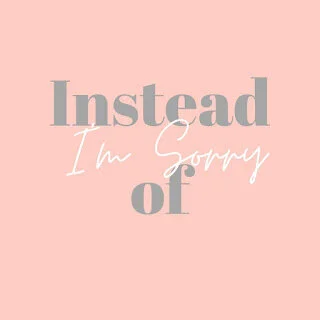Instead of I'm Sorry
This evening I decided to count the amount of times that I used the phrase "I'm Sorry" or "My apologies" in my Outlook sent emails. Keep in mind that I have currently been in my position for just under 11 months. By the time I reached month 4, I had already counted 75 and decided to stop counting. After reading through the emails, I realized that although I used the above mentioned phrases, I had not actually offended anyone or made any errors. While at the time, I may have felt that I was being accommodating, looking back it actually made me appear less confident in my abilities.
If you, like me struggle with "Over Apologizing", I thought I would share a different approach that will allow you to convey what you really mean.
5 Phrases to Use Instead of "I'm Sorry"
Instead of "Sorry I'm late..."
Try "Thank you for your patience." Replacing I'm sorry with thank you, changes what could have been received as a negative mistake into a moment for you to express your gratitude.
Instead of "Sorry, can I interrupt..."
Try "Is now a good time?" Don't apologize for having an opinion or a question that will enable you to get your job done says Loren Margolis of Training & Leadership Success LLC.
Instead of "My apologies, I missed that..."
Try "Thanks so much for pointing that out, is there anything else that should be noted?" This allows you to focus on what's needed to bring about the desired outcome, not on what you need. Express greater self-awareness and self-restraint noted Jay Steven Levin of WinThinking.
Instead of "Sorry, I have a question..."
Try "I'd like to ask a question, please." Career Coach Kathy Caprino notes Just by re-framing your speech, Caprino says, "You'll gain more awareness about what you really feel. You can be polite without apologizing for what you have every right to share." If you say something and preface it with "Sorry, but," she adds, "it completely undermines the power of your statements."
Instead of using "I'm sorry" to show sympathy...
Try "That sounds like it was really hard for you." Sorry often conveys sympathy, which rarely makes the other person feel heard, valued or better. -Jenn Lofgren, Incito Leadership and Executive Coaching, Incito Executive & Leadership Development.
Before you feel compelled to blurt out or type out "I'm Sorry", take a deep breath, relax and think about what it is you are are trying truly trying to convey. Losing what experts are calling the the "I'm sorry" verbal tic, gives you a stronger stance. Says Anita Bruzzese, author of 45 Things You Do That Drive Your Boss Crazy: And How to Avoid Them. Just take an extra second to think before you speak.

